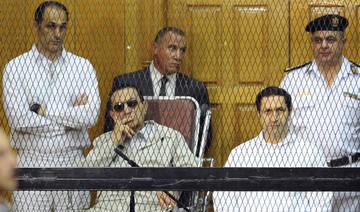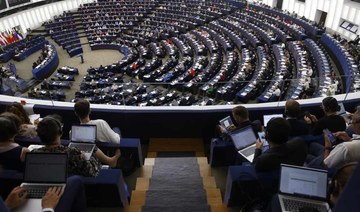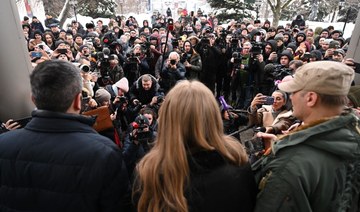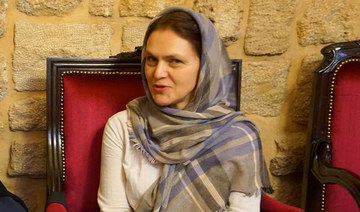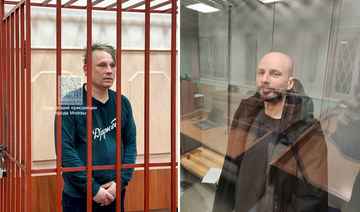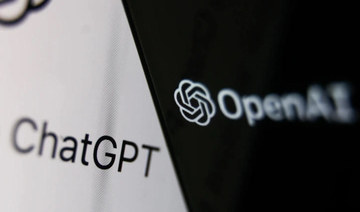CAIRO: Echoing some of President Donald Trump’s rhetoric, authorities in Egypt are taking aim at an alleged barrage of “fake news” they say is meant to sow division and undermine the rule of general-turned-president Abdel-Fattah El-Sisi.
Under a new law, the state’s top media regulatory agency can now use the “fake news” label to shut down social media accounts with more than 5,000 followers, without having to obtain a court order. Another new law allows blocking websites with content deemed a threat to national security.
Last month, the government set up a unit tracking alleged rumors, after El-Sisi claimed without elaborating that the government had identified some 21,000 rumors having been circulated over a three-month period this year. The Cabinet often issues statements refuting purported rumors.
Government critics denounce the measures as the latest attempt to suppress dissent and silence what is left of independent journalism. Over the past few months, some 500 online sites have been blocked, as part of the state’s growing control over the media, according to an Egyptian watchdog, the Association for Freedom of Thought and Expression.
“They (authorities) have blocked all sources of information,” said Khaled el-Balshy, a prominent pro-democracy activist and former board member of the Journalists’ Union. “They confiscate the media and any area of free speech, even on social media.”
Two of his websites were recently blocked, including one just nine hours after its June 19 launch. He said the government did not publicize the decision or provide an explanation.
Trump has repeatedly accused critical media outlets of being producers of “fake news,” labelling them “the enemy of the people,” and only lauding those that cover him favorably.
Egypt’s government never said publicly that it was embracing Trump’s media policies, but El-Sisi, a staunch Trump ally, has made clear that he wants to see the media united behind him.
El-Sisi has alleged that Egypt and other Arab nations are being threatened by rumors.
“The real danger is blowing up countries from within,” El-Sisi said in July. “Rumors, terrorist acts, losing hope and frustration, all these (things) function in an incredible network aiming at one objective: to stir up people to destroy their country.”
In recent years, more restrictive media policies have been adopted elsewhere in the Arab world as governments crack down on social media content.
The Palestinian self-rule government, for example, last year clamped down on social media and news websites — main outlets for debate and dissent in the West Bank — with a vaguely worded law that allows for charges of harming “national unity” or the “social fabric.”
In Egypt, officials have pointed to several recent reports on social media networks that they said were blatantly false and seemed designed to spread panic.
One report claimed poisoned tomatoes were being sold in the markets. Another said authorities planned to tax bank deposits. A third rumor warned depositors that the government planned to seize their foreign currency accounts and give them their equivalent in Egyptian pounds.
Not surprisingly, authorities are blaming the misinformation on the Muslim Brotherhood group, which was designated a terrorist organization after the 2013 military overthrow of President Muhammad Mursi, who hails from the group, amid mass street protest against his one-year rule.
The government has treated the Brotherhood as its main domestic enemy since then.
Thousands of people — mostly Islamists but also secular, pro-democracy advocates — have been jailed since 2013 as restrictions were placed on civil society groups and freedom of expression. The crackdown continues amid rising discontent over price hikes for food, transport and utilities.
The government has also clamped down on independent journalists, activists and bloggers, detaining dozens who now face an array of charges, chief among which is disseminating false news, according to Mokhtar Mounir, a rights lawyer who represents several detainees.
Among those detained were many social media heavyweights critical of the government, including famous blogger Wael Abbas, and political activists Hazem Abdel-Azim and Shady Harb.
Earlier this year, authorities shut down an independent news site after it published an Arabic translation of a New York Times article alleging that voters in this year’s presidential election were offered cash, food and promises of better services if they cast their ballots. The site’s editor was arrested.
Authorities said the site was operating without license and charged it with spreading false news and belonging to an outlawed group, political parlance for the Muslim Brotherhood.
At about the same time, the editor of one of Egypt’s popular dailies — el-Masri el-Youm — was fired over an article that catalogued state-sponsored efforts to boost the turnout in the March vote. Election authorities said the article was an “insult” to the state, several staff members along with its editor, Mohammed el-Sayed Saleh, were questioned by prosecutors and the paper was fined 150,000 Egyptian pounds ($8,400).
The head of the government’s new “rumor tracking unit,” Naayim Saad Zaghloul, said her staff is focusing on social media. “It is fertile ground for rumors to spread, and we have personnel in the field to monitor rumors and address them immediately,” she said.
The state media and private, pro-government TV networks broadcast daily announcements warning against purported lies on social media.
State-run Nile News TV ran an ad claiming to have identified eight fake reports within 10 days.
The pro-government CBC Extra channel urged viewers not to “believe everything seen on social media.”
While Egypt says it fights fake news, critics see new crackdown
While Egypt says it fights fake news, critics see new crackdown
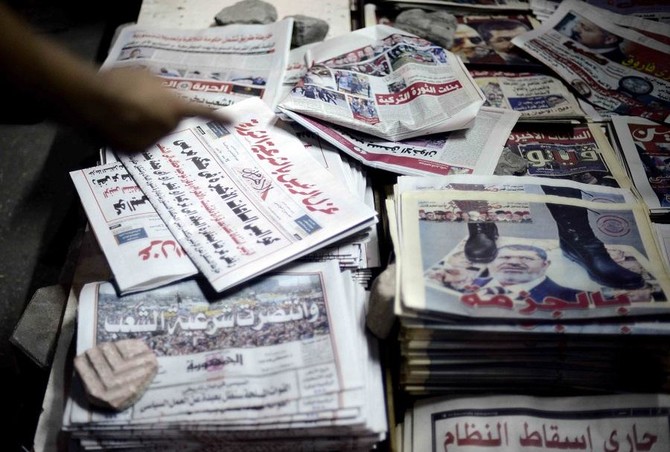
- Egypt’s government never said publicly that it was embracing Trump’s media policies
- El-Sisi has alleged that Egypt and other Arab nations are being threatened by rumors
EU bans 4 more Russian media outlets from broadcasting in the bloc, citing disinformation

- The EU has already suspended Russia Today and Sputnik among several other outlets since February 2022
BRUSSELS: The European Union on Friday banned four more Russian media outlets from broadcasting in the 27-nation bloc for what it calls the spread of propaganda about the invasion of Ukraine and disinformation as the EU heads into parliamentary elections in three weeks.
The latest batch of broadcasters consists of Voice of Europe, RIA Novosti, Izvestia and Rossiyskaya Gazeta, which the EU claims are all under control of the Kremlin. It said in a statement that the four are in particular targeting “European political parties, especially during election periods.”
Belgium already last month opened an investigation into suspected Russian interference in June’s Europe-wide elections, saying its country’s intelligence service has confirmed the existence of a network trying to undermine support for Ukraine.
The Czech government has imposed sanctions on a number of people after a pro-Russian influence operation was uncovered there. They are alleged to have approached members of the European Parliament and offered them money to promote Russian propaganda.
Since the war started in February 2022, the EU has already suspended Russia Today and Sputnik among several other outlets.
Israeli soldiers post abusive videos despite army’s pledge to act: BBC analysis

- The BBC analyzed 45 photos and videos posted online by Israeli soldiers that showed Palestinian prisoners in the West Bank being abused and humiliated
LONDON: Israeli soldiers continue to post videos of abuse against Palestinian detainees despite a military pledge to take action against the perpetrators, analysis by the BBC has found.
The broadcaster said it had analyzed 45 photos and videos posted online by Israeli soldiers that showed Palestinian prisoners in the West Bank being abused and humiliated. Some were draped in Israeli flags.
Experts say the footage and images, which showed Palestinians being stripped, beaten and blindfolded, could breach international law and amount to a war crime.
The Israel Defense Forces said some soldiers had been disciplined or suspended for “unacceptable behavior” but did not comment on the individual cases identified by the BBC.
The most recent investigation into social media misconduct by Israeli soldiers follows a previous inquiry in which BBC Verify confirmed Israeli soldiers had filmed Gazan detainees while beating them and then posted the material on social platforms.
The Israeli military has carried out arbitrary arrests across Gaza and the West Bank, including East Jerusalem, since the Hamas attack on Oct. 7. The number of Palestinian prisoners in the West Bank has since risen to more than 7,060 according to the Commission of Detainees’ Affairs and the Palestinian Prisoner Society.
Ori Givati, spokesperson for Breaking the Silence, a non-governmental organization for Israeli veterans working to expose wrongdoing in the IDF, told the BBC he was “far from shocked” to hear the misconduct was ongoing.
Blaming “current far-right political rhetoric in the country” for further encouraging the abuse, he added: “There are no repercussions. They [Israeli soldiers] get encouraged and supported by the highest ministers of the government.”
He said this played into a mindset already subscribed to by the military: “The culture in the military, when it comes to Palestinians, is that they are only targets. They are not human beings. This is how the military teaches you to behave.”
The BBC’s analysis found that the videos and photos it examined were posted by 11 soldiers of the Kfir Brigade, the largest infantry brigade in the IDF. None of them hid their identity.
The IDF did not respond when the BBC asked about the actions of the individual soldiers and whether they had been disciplined.
The BBC also attempted to contact the soldiers on social media. The organization was blocked by one, while none of the others responded.
Mark Ellis, executive director of the International Bar Association, urged an investigation into the incidents shown in the footage and called for the IDF to discipline those involved.
In response to the BBC’s investigation, the IDF said: “The IDF holds its soldiers to a professional standard … and investigates when behavior is not in line with the IDF’s values. In the event of unacceptable behavior, soldiers were disciplined and even suspended from reserve duty.
“Additionally, soldiers are instructed to avoid uploading footage of operational activities to social media networks.”
However, it did not acknowledge its pledge to act on BBC Verify’s earlier findings in Gaza, according to the broadcaster.
4 journalists killed in Gaza as death toll climbs above 100

- 104 Palestinian media workers reported dead, along with 3 Lebanese and 2 Israelis
LONDON: The Gaza Media Authority on Thursday said that four journalists had been killed in an Israeli airstrike, bringing the total number of journalists killed in the conflict to more than 100.
The victims were identified as Hail Al-Najjar, a video editor at the Al-Aqsa Media Network; Mahmoud Jahjouh, a photojournalist at the Palestine Post website; Moath Mustafa Al-Ghefari, a photojournalist at the Kanaan Land website and Palestinian Media Foundation; and Amina Mahmoud Hameed, a program presenter and editor at several media outlets, according to the Anadolu Agency.
The Gaza Media Office said the four were killed in an Israeli airstrike, but did not provide additional details on the circumstances surrounding their deaths.
A total of 104 Palestinian journalists have been killed since the conflict began on Oct. 7. Two Israeli and three Lebanese media workers also have been killed.
The latest loss adds to the already heavy toll on media workers, with the Committee to Protect Journalists saying the Gaza conflict is the deadliest for journalists and media workers since it began keeping records.
Israel is continuing its offensive on Gaza despite a UN Security Council resolution demanding an immediate ceasefire.
On Thursday, South Africa, which has brought a case accusing Israel of genocide to the International Court of Justice, urged the court to order Israel to halt its assault on Rafah.
According to Gaza medical authorities, more than 35,200 Palestinians have been killed, mostly women and children, and over 79,200 have been injured since early October when Israel launched its offensive following an attack by Hamas.
Russia outlaws SOTA opposition news outlet

- Authorities said outlet tries to destabilize the socio-political situation in Russia
- Move could criminalize SOTA content and puts its reporters at risk of arrest
LONDON: Russia declared opposition media outlet SOTA “undesirable” on Thursday, a move that could criminalize the sharing of its content and put its reporters at risk of arrest.
Authorities in Russia have declared dozens of news outlets, think tanks and non-profit organizations “undesirable” since 2015, a label rights groups say is designed to deter dissent.
In a statement, Russia’s Prosecutor General accused SOTA of “frank attempts to destabilize the socio-political situation in Russia” and “create tension and irritation in society.”
“Such activities, obviously encouraged by so-called Western inspirers, have the goal of undermining the spiritual and moral foundations of Russian society,” it said.
It also accused SOTA of co-operating with TV Rain and The Insider, two other independent Russian-language outlets based outside of the country that are linked to the opposition.
SOTA Project, which covers opposition protests and has been fiercely critical of the Kremlin, denied it had anything to do with TV Rain and The Insider and rejected the claims.
But it advised its followers in Russia to “remove reposts and links” to its materials to avoid the risk of prosecution. SOTA’s Telegram channel has around 137,000 subscribers.
“Law enforcement and courts consider publishing online to be a continuing offense. This means that you can be prosecuted for reposts from 2023, 2022, 2021,” it said.
SOTA Project was born out of a split with a separate news outlet called SOTAvision, which still covers the opposition but distanced itself from the prosecutors’ ruling on Thursday.
Since launching its offensive in Ukraine, Moscow has waged an unprecedented crackdown on dissent that rights groups have likened to Soviet-era mass repression.
Among other organizations labelled as “undesirable” in Russia are the World Wildlife Fund, Greenpeace, Transparency International and Radio Free Europe/Radio Liberty.
OpenAI strikes deal to bring Reddit content to ChatGPT

- Deal underscores Reddit’s attempt to diversify beyond its advertising business
- Content will be used to train AI models
LONDON: Reddit has partnered with OpenAI to bring its content to popular chatbot ChatGPT, the companies said on Thursday, sending the social media platform’s shares up 12 percent in extended trade.
The deal underscores Reddit’s attempt to diversify beyond its advertising business, and follows its recent partnership with Alphabet to make its content available for training Google’s AI models.
ChatGPT and other OpenAI products will use Reddit’s application programming interface, the means by which Reddit distributes its content, following the new partnership.
OpenAI will also become a Reddit advertising partner, the company said.
Ahead of Reddit’s March IPO, Reuters reported that Reddit struck its deal with Alphabet, worth about $60 million per year.
Investors view selling its data to train AI models as a key source of revenue beyond Reddit’s advertising business.
The social media company earlier this month reported strong revenue growth and improving profitability in the first earnings since its market debut, indicating that its Google deal and its push to grow its ads business were paying off.
Reddit’s shares rose 10.5 percent to $62.31 after the bell. As of Wednesday’s close, the stock is up nearly 12 percent since its market debut in March.


